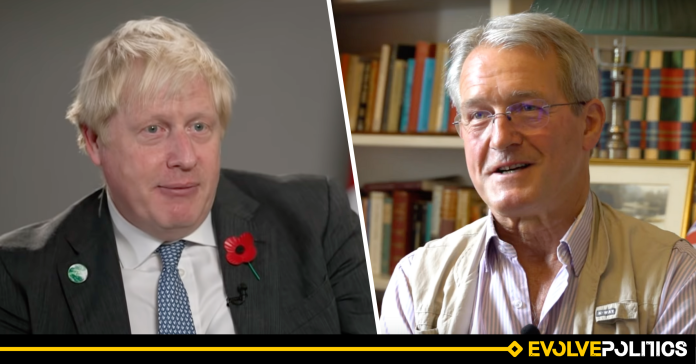Following last week’s ruling by the Parliamentary Standards Committee which found that Tory MP Owen Paterson had committed an “egregious” breach of its anti-corruption rules, Boris Johnson’s Conservative government have just voted to scrap the system which exposed his corruption. Yes, you read that correctly.
On Tuesday last week, following an inquiry by the Independent Parliamentary Standards Commissioner Kathryn Stone, a Committee of MPs found that Tory MP Owen Paterson had breached Parliament’s anti-corruption rules by “repeatedly [using] his privileged position [as an MP] to benefit two companies for whom he was a paid consultant“.
The ruling relates to Paterson’s paid advisory roles for Randox, a clinical diagnostics company, and Lynn’s Country Foods, a processor and distributor of meat products – roles for which the Tory MP was paid a total of almost a quarter of a million pounds (on top of his £82,000 taxpayer-funded salary as an MP).
Both the Commissioner and the cross-party Committee found that Paterson had breached Parliament’s anti-corruption rules on an astonishing 36 separate occasions by:
- lobbying the Food Standards Agency three times on behalf of Randox
- lobbying the Food Standards Agency seven times on behalf of Lynn’s Country Foods
- lobbying Ministers at the Department for International Development four times on behalf of Randox
- failing to declare his interest as a paid consultant to Lynn’s Country Foods in four emails to officials at the Food Standards Agency
- using his Parliamentary office for business meetings with his clients on 16 separate occasions
- sending two letters relating to his business interests on official House of Commons headed notepaper
In addition, the Committee found that Mr Paterson had repeatedly attempted to smear the Independent Commissioner by making “serious, personal, and unsubstantiated allegations against the integrity of the Commissioner and her team.”
Moreover, the Committee claimed that they had never “seen so many breaches or such a clear pattern of behaviour in failing to separate private and public interests.”
Owing to the “serious” nature of Paterson’s rule-breaking, the Committee recommended that the Tory MP should be handed the toughest penalty, a 30 day suspension from the House of Commons – a punishment which could ultimately lead to Mr Paterson losing his North Shropshire seat if enough of his constituents sign a recall petition.
The Committee – which consisted of four Tory MPs, two Labour MPs, one SNP MP, and seven lay members – endorsed the report and its recommendations unanimously – apart from Tory MP Bernard Jenkin, who recused himself owing to his personal friendship with Mr Paterson.
Recommendations by the Standards Committee are always subject to formal votes in the House of Commons to approve them, but usually they are passed ‘on the nod’ – meaning that no MPs oppose them.
However, despite the Committee’s universal agreement, dozens of Mr Paterson’s Tory allies have publicly condemned the findings over the last week – with Mr Paterson also claiming that the procedure was “biased” against him, and alleging that it played a major role in his wife’s suicide last summer.
This outcry culminated in an amendment being tabled by Tory MP Andrea Leadsom, which called on MPs to reject the findings against Mr Paterson and to set up a Tory-controlled Committee to debate scrapping the system which exposed them.
Leadsom’s amendment states that, owing to “potential defects” in the current Standards procedures, MPs should reject the Committees findings against Mr Paterson.
in addition, Leadsom’s amendment seeks to set up a government-controlled Committee, led by disgraced Tory MP John Whittingdale, tasked with scrapping and replacing the current anti-corruption procedures.
The Committee would consist of four Tory MPs, three Labour MPs and one SNP MP, with Whittingdale given the deciding vote – effectively giving the government complete control over proceedings.
And just now in the House of Commons, Boris Johnson, along with 250 of his fellow Tory MPs, managed to vote it through.
After announcing the result, numerous cries of “shame” were directed at the government from the opposition benches.
Evolve will be publishing a full list of how individual MPs voted shortly.

